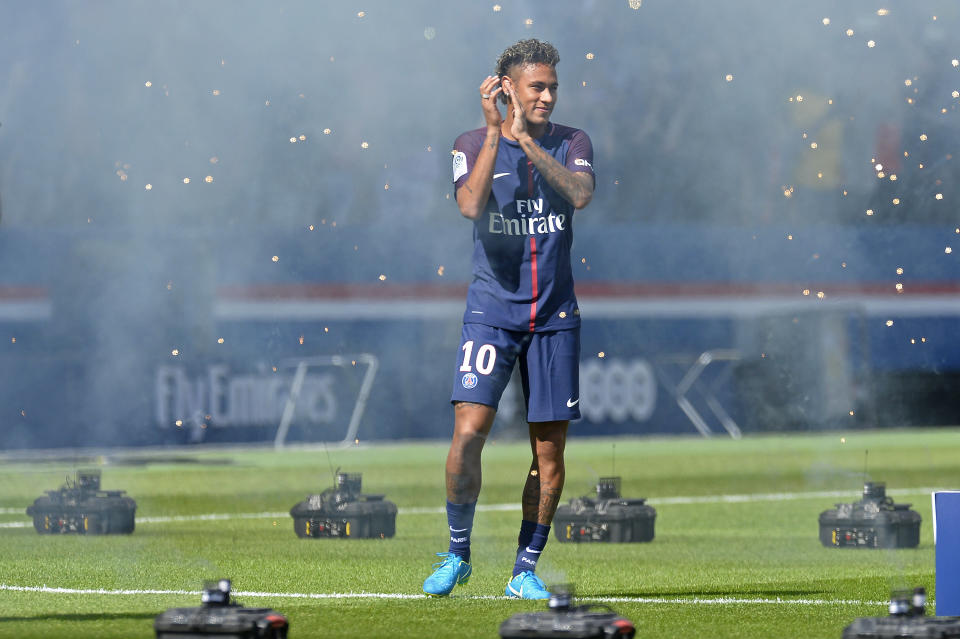The ambitious PSG project is nearing completion

As a kid growing up in Belgium, we spent our summer vacations on France’s western coast. We’d be out there for a month or so – because European holiday schedules. As you would expect, being that we were in France, we’d come across lots of French people. But sightings of Paris Saint-Germain jerseys were extremely rare. I owned one myself, and was told by an older kid that if I was seen wearing it in the wrong place, I might get beat up by fans of Bordeaux, the local club.
Usually, my own PSG jersey would be the only one I’d see in that area all summer. Back then, a time neatly spanning the 1990s, PSG was in its 20s as a club. It’s easy to forget now, with the Parisians dominating the transfer market, but it was only founded in 1970. Paris had no first division soccer club then, and so two existing clubs merged to form one.
Paris wasn’t a soccer town. To many of its inhabitants, it still isn’t a soccer town.
At any rate, I was back on that same French coast for two weeks earlier in August. A little further north this time, near Nantes. And the contrast was startling. Every day, I would spot a good dozen pieces of PSG merchandise. Still not as often as I’d see Olympique Marseille stuff, mind you, as that club remains perhaps the most popular in the country, in spite of its eternal dysfunction. But PSG was everywhere. Neymar jerseys. Zlatan jerseys. Everybody jerseys.
What PSG is trying to do – doing, really – is fairly unprecedented. It’s essentially building a big club out of whole cloth. Because until half a decade ago, PSG was not a big club, hard as you might have tried to see it otherwise. It was a famous club because it was located in a famous city. But until 2013, it had won Ligue 1 just once and had a lone European Cup Winners’ Cup title to show for its continental campaigns.
PSG had the potential to be big. But in reality, it wasn’t.
Then, as you doubtless know, the club was bought by a Qatari group that’s more or less a proxy for its government in 2011 and it all changed. It began spending big right away, and saw that escalation through to its conclusion this summer.
In the past few weeks, PSG has broken the old transfer world record twice. First for Barcelona’s Neymar, more than doubling the old record with a baffling 222 million euro fee. On Thursday, it also signed Kylian Mbappe from Monaco. The move is technically a loan with an obligation, either contractual or verbal and moral, to buy him outright next summer for 180 million euros. That, too, shatters the old record of 105 million euros, paid out by Manchester United to Juventus for Paul Pogba just a year ago.
PSG is now inarguably the big dog of the transfer market.
How they’ll square it with UEFA’s Financial Fair Play regulations – which allows only for modest losses over a three-year period, at the peril of exclusion from European competition – remains to be seen. But all the same, PSG spent almost half a billion dollars on just two players.
Those are necessarily splashy moves. PSG is building a following. And given the apparent dearth of serious soccer fans in Paris, it had to build a global fan base. Just as all truly big clubs now must in order to generate enough revenue to compete. There’s a reason every single Champions League contender tours the world during the preseason, and sometimes the postseason as well. Brands must be built. To then be monetized.
In Neymar, PSG poached the world’s best player not named Lionel Messi or Cristiano Ronaldo, only one who is half a decade younger than both. Mbappe could become a truly all-time-great striker.
In order to establish itself as a big club, PSG had to outdo the big clubs. Spend more. Impress more. Win more. A run of four straight French titles largely accomplished the latter, accompanied by runs to the Champions League quarterfinals in those same four years to cement its bona fides – although a continental breakthrough will become paramount at some nearby point.
Inevitably, more prices will follow. The project must be reaching its apex now. Meantime, PSG is slowly conquering the soccer world. And the beach towns contained therein.
Leander Schaerlaeckens is a Yahoo Sports soccer columnist and a sports communication lecturer at Marist College. Follow him on Twitter @LeanderAlphabet.



